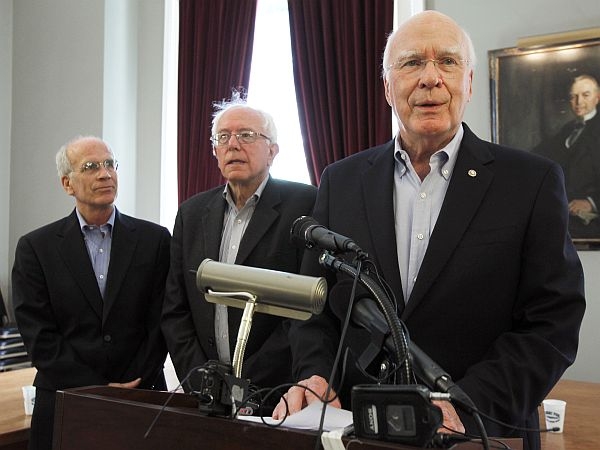
All three members of Vermont’s congressional delegation say it’s critical to include a new dairy pricing system in the 2012 farm bill.
As passed by the Senate last month, the new five-year farm bill cuts spending on a variety of agriculture programs by $24 billion over the next 10 years.
The bill creates a new pricing program for dairy farmers that’s designed to stabilize their milk prices. Under this voluntary program, farmers could purchase an insurance policy that would pay them when prices drop below the cost of production. Senator Patrick Leahy says this approach is desperately needed.
"Now we can get us away from that roller coaster. We can discourage oversupply," said Leahy. "We can have some stability to dairy farmers and I think that’s extremely important."
Senator Bernie Sanders says he’s pleased that the bill also includes disincentives to discourage the overproduction of milk.
"At the end of the day, in my view we are going to need supply management because when prices go down and farmers breed more and more cows, milk more and more cows, that just drives the price down even further-more milk is in the market," he said.
The House will consider this bill later this month. Congressman Peter Welch serves on the House Agriculture Committee and he says some members want to take the new dairy pricing plan out of the legislation.
"We’ve got to fight that back," Welch said. "So job one for me and my colleagues will be to resist that effort to strip the Ag bill of that absolutely crucial market stabilization piece."
The Senate bill also cuts spending on food nutrition programs by $4.5 billion. Senator Leahy says some senators wanted to make even larger cuts but were not successful. Leahy says the debate over nutrition highlights the sorry state of politics in Washington.
"I think what is really wrong is to see the people who have voted for a blank check for Iraq and Afghanistan who are willing to borrow the money because they don’t want to pay for what they’re saying in Iraq and Afghanistan," said Leahy. "And then they say, ‘But we cannot afford something we need at home.’ As far as I’m concerned, that is the shame of what is happening in Washington today."
Congressman Welch says some Republican leaders have proposed cutting the nutrition programs by as much as $33 billion. Welch says that kind of reduction is unacceptable and he’s working to have the House adopt a cut that’s similar to the one in the Senate bill.